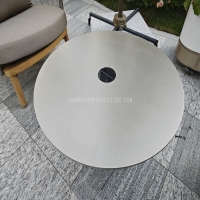Welcome to the website for landscape facilities products and knowledge.
How can landscape bar counters be designed to minimize environmental impact and promote sustainability?
Designing landscape bar counters with sustainability at the forefront requires a holistic approach that considers material selection, energy efficiency, and environmental integration. The journey toward eco-conscious design begins with selecting reclaimed or rapidly renewable materials such as FSC-certified teak, recycled composite lumber, or repurposed natural stone. These materials not only reduce landfill waste but often develop a beautiful patina over time, enhancing the bar's aesthetic appeal while minimizing maintenance needs.
Innovative manufacturers now incorporate post-consumer recycled glass, ceramics, and even ocean plastics into countertop surfaces, creating durable works of art that tell a sustainability story. The structural framework can utilize upcycled steel or aluminum, significantly reducing the embodied energy compared to virgin materials. For a truly circular approach, consider designing modular components that can be disassembled and repurposed at the end of the bar's life cycle.
Energy efficiency plays a crucial role in sustainable bar counter design. Integrate solar-powered LED lighting systems with motion sensors to illuminate the space only when needed. For cooling systems, choose energy-star rated refrigeration units that use natural refrigerants rather than hydrofluorocarbons. Where possible, incorporate passive cooling techniques such as strategic shading and natural ventilation to reduce reliance on electrical systems.
Water management represents another critical consideration. Install water-saving faucets with aerators and consider connecting to rainwater harvesting systems for cleaning purposes. Incorporate built-in drainage that directs runoff to surrounding landscaping rather than storm drains, allowing natural filtration through soil and plant roots. For bars that serve beverages, implement a system for collecting and repurposing ice meltwater for irrigation.
The integration with the surrounding landscape offers additional sustainability opportunities. Design bars to complement existing topography rather than requiring extensive grading. Create living edges where native plants cascade over portions of the structure, providing habitat while naturally regulating temperature through transpiration cooling. Consider incorporating herb gardens or edible plants directly into the bar design, creating both functional garnishes and natural beauty.
Finally, consider the bar's entire lifecycle during the design process. Choose finishes and sealants with low volatile organic compounds (VOCs) to maintain healthy air quality. Design for durability and easy repair rather than replacement, and plan for eventual disassembly and material recovery. By embracing these comprehensive sustainable design strategies, landscape bar counters can become showcases of environmental responsibility while providing beautiful, functional spaces for entertainment and connection with nature.
Related search:

Recommendation
Outdoor stainless steel table with solar-powered ambient lighting feature - excellent design.